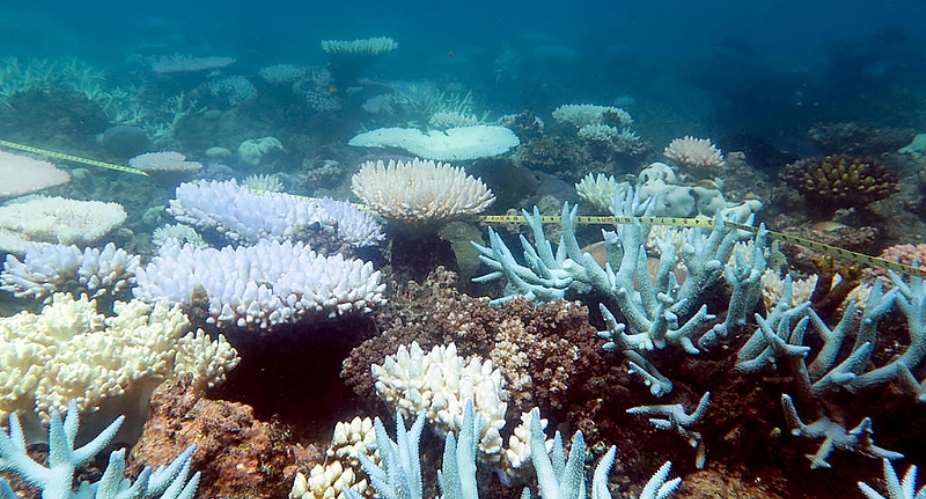Australia's Great Barrier Reef has lost half of its corals over the past 25 years due to climbing ocean temperatures, a new study has found.
Scientists from the Australian Research Council (ARC) Centre of Excellence for Coral Reef Studies in Queensland said mass bleaching had depleted 50 percent of all coral sizes and species between 1995 and 2017.
The northern-most part of the reef, which suffered extreme heat stress during back-to-back marine heatwaves in 2016 and 2017, was worst damaged.
Populations of the usually fast-growing branching and table-shaped corals were particularly hit, the study's lead author Andreas Dietzel told RFI.
“These corals are quite susceptible to high temperatures and to heat stress,” Dietzel said. “Unfortunately, they're also very important for the system because they provide a lot of the habitat for fish.”
Bleaching trauma
The world's largest reef system – a 2,300km Unesco World Heritage site that is home to hundreds of species of corals – has suffered three mass bleaching events over the past five years.
Because the ARC team's research was carried out before the most recent bleaching earlier this year – the most severe on record – the damage may actually be worse than the study suggests.
“There's a good chance we've since lost corals in the far south of the reef,” Dietzel said, adding that it would take time to assess the full damage.
Authors of the study, published Wednesday in the journal Proceedings of the Royal Society B, warn “there is no time to lose” in ensuring carbon emissions are rapidly reduced.
Last year a five-year review of the reef's health by the government agency that manages the site said rising temperatures were the biggest threat to its survival.
Recovery uncertain
Scientists worry the corals are losing their ability to recover and regenerate, a process that usually takes many years.
“It used to be a rule of thumb that we would bounce back within 10 years, when damaged reefs were in the vicinity of a lot of healthy reefs,” Dietzel explains. “Baby corals would travel tens of kilometres before settling into a new habitat.”
But the widespread mortality of 2016 and 2017, coupled with further bleaching in early 2020, has likely compromised the reef's resilience.
“It's more likely the recovery will be a lot slower, because we've lost a lot of the large colonies, which are mainly the ones reproducing," Dietzel says.
While coral reefs cover only 0.2 percent of the oceans, they are home to 30 percent of marine biodiversity. In the Great Barrier Reef alone, there are more than 1,500 species of fish and hundreds of species of corals.
A 2018 UN report on the impact of global warming of 1.5C above pre-industrial levels found that up to 90 percent of coral reefs would be lost by 2050.
Temperature increases of 2C, it warned, mean the world's corals may never be able to grow back.





 A/R: Achiase Chief arrested for acid attack on community members
A/R: Achiase Chief arrested for acid attack on community members
 Aggrieved butchers reject increment of slaughter fees, threaten street protest ...
Aggrieved butchers reject increment of slaughter fees, threaten street protest ...
 Naa Ayemoede returns to school
Naa Ayemoede returns to school
 Arrest “notorious” land guards terrorising land owners – Samuel Ayeh-Paye to Pol...
Arrest “notorious” land guards terrorising land owners – Samuel Ayeh-Paye to Pol...
 Dadieso residents block Accra-Kumasi highway
Dadieso residents block Accra-Kumasi highway
 Kasoa soldier killer remanded
Kasoa soldier killer remanded
 Rashid Pelpuo slams Opoku Prempeh for denying dumsor
Rashid Pelpuo slams Opoku Prempeh for denying dumsor
 Bawumia lacks new ideas, stealing from Mahama — Joyce Bawa alleges
Bawumia lacks new ideas, stealing from Mahama — Joyce Bawa alleges
 Societe Generale to exit Ghana, other African countries
Societe Generale to exit Ghana, other African countries
 May 4: Cedi sells at GHS13.99 to $1, GHS13.42 on BoG interbank
May 4: Cedi sells at GHS13.99 to $1, GHS13.42 on BoG interbank
